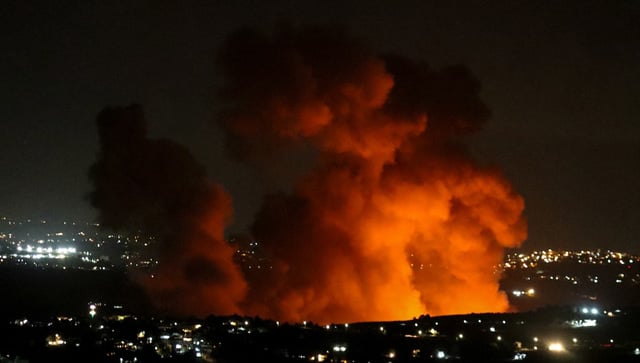Israeli warplanes pounded southern Lebanon Saturday, raising fears of all-out war a day after an Israeli strike on Beirut left senior Hezbollah commanders among the 37 people Lebanese officials reported killed.
Dozens of Israeli warplanes were “widely” striking Hezbollah targets in southern Lebanon “to eliminate threats against the citizens of Israel,” military spokesman Rear Admiral Daniel Hagari said.
For nearly a year, Iran-backed Hezbollah fighters in Lebanon have traded cross-border fire with Israeli forces in support of Palestinian ally Hamas, whose October 7 attack on Israel triggered war in Gaza.
But the cross-border exchanges have escalated since late August.
Lebanon’s official National News Agency reported that Israeli warplanes had launched “a large-scale air attack” Saturday evening over south Lebanon.
With heavy equipment still working beneath high-rise buildings at the site of the Beirut strike, Lebanon’s health ministry reported six more dead, up from 31 earlier Saturday.
AFPTV footage showed mourners gathering in the Lebanese capital for funerals of three of the slain Hezbollah members.
“We thought the war had started,” said Zeinab, 35, a housewife who preferred to be identified only by her first name, recalling the noise that accompanied the strike. – ‘Horrific massacres’ –
Lebanese Prime Minister Najib Mikati decried “horrific massacres” and said he had cancelled his trip to the annual United Nations General Assembly in New York.
Germany said there was “an urgent need” to defuse tensions. The UN has also voiced concern about “heightened escalation” and called for “maximum restraint” from all sides.
The US State Department meanwhile urged Americans in Lebanon to leave the country while commercial options remain available.
Earlier Saturday, an Israeli military statement said Israeli aircraft “struck thousands” of rocket launchers ready to fire from southern Lebanon, as well as “approximately 180” other, unspecified targets.
AFP correspondents reported intense Israeli strikes over a wide area of southern Lebanon.
Hezbollah said it targeted at least seven military positions in northern Israel and the annexed Golan Heights with rockets on Saturday.
Israel’s military said the militants had fired “about 90” rockets by late
afternoon.
– ‘Targeted strike’ –
Lebanon’s Health Minister Firass Abiad said three children and seven women were killed in Friday’s strike on an underground meeting room in a densely populated neighbourhood of the capital’s southern suburbs, a Hezbollah stronghold.
Israel said the “targeted strike” had killed the head of Hezbollah’s elite Radwan Force, Ibrahim Aqil, and several other commanders.
A source close to Hezbollah said a total of 16 Radwan Force members were killed during a meeting.
The Radwan Force has spearheaded Hezbollah’s ground operations, and Israel has repeatedly called for its fighters to be pushed back from the border.
Confirming the death of Aqil, Hezbollah hailed him as “one of its great leaders”.
Washington had offered a $7 million reward for information on Aqil, calling him a “principal member” of the organisation behind the 1983 Beirut US embassy bombing, which killed 63.
– ‘Penetrate and disrupt’ –
Hezbollah said a second senior commander, Ahmed Mahmud Wahbi, had also been killed Friday. He headed the group’s operations against Israel from the onset of the Gaza war in October until the start of this year, it said.
In July, another Israeli strike on Beirut killed Fuad Shukr, a top Hezbollah operations chief.
Friday’s strike also followed sabotage attacks on pagers and two-way radios used by Hezbollah on Tuesday and Wednesday, which killed 39 people. Hezbollah blamed Israel, which has not commented.
Hezbollah chief Hassan Nasrallah acknowledged an “unprecedented” blow, vowing that Israel would face retribution for what he called a possible “act of war”.
Months of near-daily exchanges have killed hundreds in Lebanon, mostly fighters, and dozens in Israel and the annexed Golan, forcing tens of thousands on both sides to flee their homes.
Israeli Prime Minister Benjamin Netanyahu on Tuesday announced an expansion of the country’s war goals to include the return of northern Israeli residents.
On Saturday, posting on X, formerly Twitter, he said: “Our objectives are clear and our actions speak for themselves.”
International mediators, including the United States, are trying to stop the Gaza war from becoming a regional conflict.
Netanyahu’s critics in Israel have accused the prime minister of dragging out the war. Thousands again gathered in Tel Aviv Saturday night demanding a deal to free captives still held by Hamas.
Shahar Mor, nephew of slain hostage Avraham Munder, said he feared the fight against Hezbollah would again distract leaders who “focus on the illusion of ‘absolute victory'”.
– Gaza school strike –
In Gaza on Saturday, the civil defence agency said an Israeli strike on Al- Zeitun School C, which had been turned into a displaced shelter, killed 21 people including 13 children and six women, one of them pregnant.
Israel’s military said the strike targeted Hamas militants who were “embedded inside” an adjacent school, and that it had taken steps “to mitigate the risk of harming civilians”.
An AFP reporter confirmed Al-Zeitun School C was hit.
In late August the United Nations said Israel had struck at least 23 school shelters since July 4.
Israel has repeatedly accused Hamas of operating from such facilities in highly urbanised Gaza, a charge the militants deny.
The October 7 attack that triggered the war resulted in the deaths of 1,205 people, mostly civilians, on the Israeli side, according to an AFP tally based on Israeli official figures that include hostages killed in captivity.
Of 251 hostages seized by militants, 97 are still held in Gaza, including 33 the Israeli military says are dead.
Israel’s retaliatory military offensive has killed at least 41,391 people in Gaza, most of them civilians, according to figures provided by the Hamas-run territory’s health ministry. The UN has acknowledged the figures as reliable.

